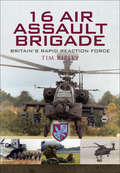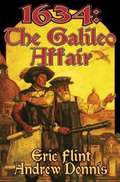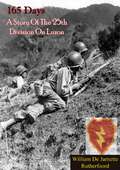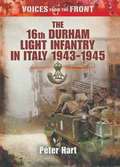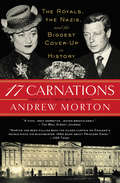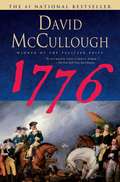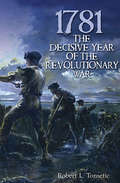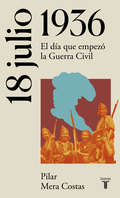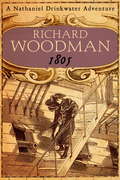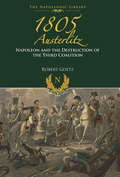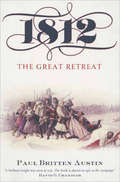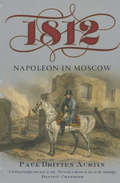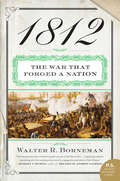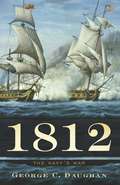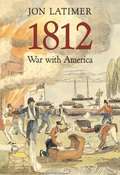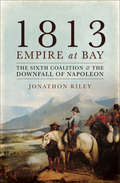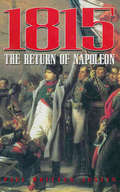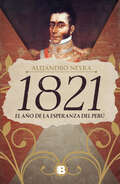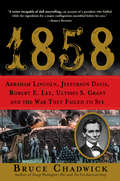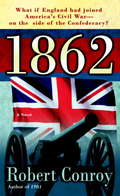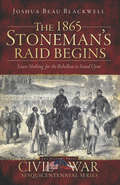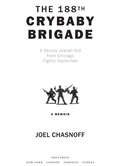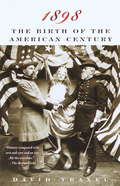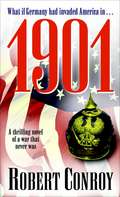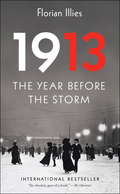- Table View
- List View
16 Air Assault Brigade: Britain's Rapid Reaction Force
by Tim RipleyAfter the S.A.S., 16 Brigade is the most high profile formation in the British Army but to date there has been no complete history of its operations and activities. The aim of this book is to produce a history of Britains Elite Rapid Reaction Force 16 Air Assault Brigade.It will provide a historical narrative of 16 Brigades operations since its formation in 1999. It explains the innovative tactics and operational procedures used by to move by air into battle. It covers military hardware, the Brigade has some of the UKs most advanced weapon system, including Apache attack helicopters. It will include the elite combat units including the Parachute Regiment and Pathfinders. Key personalities from the Brigade will be examined together with a comprehensive analysis of how the Brigade has performed and how it is likely to evolve in coming years.The Brigade is due to return to Afghanistan in 2008 so its public profile will remain high.
1634: The Galileo Affair
by Eric Flint Andrew DennisEUROPEAN CUNNING MEETS AMERICAN COURAGE The Thirty Years War continues to ravage 1 7th century Europe, but a new force is gathering power and influence: the United States of Europe, forged by an alliance between Gustavus Adolphus, King of Sweden, and the West Virginians from the 20th century led by Mike Stearns who were hurled centuries into the past by a mysterious cosmic accident. The democratic ideals of the USE have aroused the implacable hostility of Cardinal Richelieu, effective ruler of France, who has moved behind the scenes, making common cause with old enemies to stop this new threat to the privileged and powerful. But the USE is also working behind the scenes. A group of West Virginians have secretly traveled to Venice where their advanced medical knowledge may prevent the recurrence of the terrible plague which recently killed a third of the city-state's population. At the same time, the group hopes to establish commercial ties with Turkey's Ottoman Empire, then at the height of its power. And, most important, they hope to establish private diplomatic ties with the Vatican, exploiting Pope Urban VIU's misgivings about the actions of Richelieu and the Hapsburgs.
165 Days: A Story Of The 25th Division On Luzon
by William De Jarnette Rutherford165 Days: A Story Of The 25th Division On Luzon by William De Jarnette Rutherfoord is a gripping and meticulously illustrated account of the 25th Infantry Division's pivotal role in the liberation of Luzon during World War II. Through vivid storytelling and firsthand accounts, Rutherfoord brings to life the harrowing experiences, intense battles, and unwavering determination of the soldiers who fought to reclaim the Philippines from Japanese occupation.The book covers the 165 days of relentless combat that defined the 25th Division’s campaign on Luzon, the largest and most strategically significant island in the Philippines. Rutherfoord, a member of the division, provides an insider's perspective on the brutal realities of jungle warfare, the challenges of supply and communication, and the indomitable spirit of the soldiers who faced overwhelming odds in their mission to secure victory.165 Days offers readers a detailed chronicle of the division’s maneuvers, from the initial landings to the final push that led to the liberation of Manila and the collapse of Japanese resistance. Rutherfoord captures the camaraderie, bravery, and sacrifices of the men in the division, highlighting both the human cost of war and the resilience of those who served.The book also delves into the strategic importance of the Luzon campaign, explaining how the actions of the 25th Division contributed to the broader Allied effort to defeat Japan in the Pacific Theater. Maps, photographs, and other illustrations complement the narrative, providing a comprehensive understanding of the terrain, tactics, and experiences of the soldiers.165 Days: A Story Of The 25th Division On Luzon is an essential read for military historians, veterans, and anyone interested in the Pacific War. William De Jarnette Rutherfoord’s compelling narrative honors the legacy of the 25th Infantry Division, offering a powerful testament to the courage and dedication of the men who fought to liberate the Philippines.This book stands as a tribute to the enduring spirit of the 25th Division, ensuring that the story of their sacrifice and triumph will never be forgotten.
The 16th Durham Light Infantry in Italy, 1943–1945: An Oral History Of The Great War (Voices from the Front)
by Peter HartThe Second World War is vanishing into the pages of history. The veterans were once all around us, but their numbers are fast diminishing. While still in their prime many recorded their memories with Peter Hart for the Imperial War Museum. As these old soldiers now fade away their voices from the front are still strong with a rare power to bring the horrors of war back to vivid life. The 16th Durham Light Infantry were supposed to be just an 'ordinary' battalion. But their experiences as they fought their way up through Italy show that there is no such thing as 'ordinary'. They struggled to break out from Salerno, then across the countless rivers and mountain ranges that seemed to spring up to bar their way to victory. They learnt their military skills the hard way facing determined German opposition every step of the way. These were no 'D-Day Dodgers' but heroes in their own right. But there was another battle being fought as they struggled to maintain their morale day by day, as their friends died and their seemed to be no end in sight. This is their story.Peter Hart was born in 1955. After attending Liverpool University he has worked as the Oral Historian at the Imperial War Museum since 1981, He is responsible for interviewing veterans of all conflicts from the Great War to the present day. His previous books include 1918: A Very British Victory, The Somme, 1916, Aces Falling: War Above the Trenches, 1918 and Jutland, 1916. His Voices from the Front series with Pen & Sword includes, The 16th Durham Light Infantry, The 2nd Norfolk regiment and the South Notts Hussars. He is married with two children and lives in North London
17 Carnations: The Royals, the Nazis, and the Biggest Cover-Up in History
by Andrew MortonA meticulously researched historical tour de force about the secret ties among Franklin D. Roosevelt, Winston Churchill, the Duke of Windsor, and Adolf Hitler before, during, and after World War II.Andrew Morton tells the story of the feckless Edward VIII, later Duke of Windsor, his American wife, Wallis Simpson, the bizarre wartime Nazi plot to make him a puppet king after the invasion of Britain, and the attempted cover-up by Churchill, General Eisenhower, and King George VI of the duke's relations with Hitler. From the alleged affair between Simpson and the German foreign minister to the discovery of top secret correspondence about the man dubbed "the traitor king" and the Nazi high command, this is a saga of intrigue, betrayal, and deception suffused with a heady aroma of sex and suspicion.For the first time, Morton reveals the full story behind the cover-up of those damning letters and diagrams: the daring heist ordered by King George VI, the smooth duplicity of a Soviet spy as well as the bitter rows and recriminations among the British and American diplomats, politicians, and academics. Drawing on FBI documents, exclusive pictures, and material from the German, Russian, and British royal archives, as well as the personal correspondence of Churchill, Eisenhower, and the Windsors themselves, 17 CARNATIONS is a dazzling historical drama, full of adventure, intrigue, and startling revelations, written by a master of the genre.
1776: 1776, Brave Companions, The Great Bridge, John Adams, The Johnstown Flood, Mornings On Horseback, Path Between The Seas, Truman, The Course Of Human Events
by David McCulloughAmerica&’s beloved and distinguished historian presents, in a book of breathtaking excitement, drama, and narrative force, the stirring story of the year of our nation&’s birth, 1776, interweaving, on both sides of the Atlantic, the actions and decisions that led Great Britain to undertake a war against her rebellious colonial subjects and that placed America&’s survival in the hands of George Washington.In this masterful book, David McCullough tells the intensely human story of those who marched with General George Washington in the year of the Declaration of Independence—when the whole American cause was riding on their success, without which all hope for independence would have been dashed and the noble ideals of the Declaration would have amounted to little more than words on paper. Based on extensive research in both American and British archives, 1776 is a powerful drama written with extraordinary narrative vitality. It is the story of Americans in the ranks, men of every shape, size, and color, farmers, schoolteachers, shoemakers, no-accounts, and mere boys turned soldiers. And it is the story of the King&’s men, the British commander, William Howe, and his highly disciplined redcoats who looked on their rebel foes with contempt and fought with a valor too little known. Written as a companion work to his celebrated biography of John Adams, David McCullough&’s 1776 is another landmark in the literature of American history.
1781: The Decisive Year of the Revolutionary War
by Robert L. Tonsetic<p>A detailed chronicle—including eyewitness accounts—of the year American Patriots turned the tables on the British in the US War of Independence.<p> <p>In 1781, the future of America hung by a thread. British troops occupied key coastal cities, from New York to Savannah. After several harsh winters, the American army was fast approaching the breaking point. Mutinies began to emerge in George Washington’s ranks, and it was only the arrival of French troops that provided a ray of hope for the American cause.<p> <p>1781 was a year of battles, from the Patriot victory in the Battle of Cowpens, to Gen. Nathaniel Greene’s impressive Southern campaign. In the Siege of Yorktown, the French fleet, the British fleet, Greene, Washington, and the French army under Rochambeau all converged in a fateful battle that would end with Cornwallis’s surrender on October 19.<p> <p>In this book, Robert Tonsetic provides a detailed analysis of the key battles and campaigns of 1781, supported by numerous eyewitness accounts, from privates to generals in the American, French, and British armies. He also describes the diplomatic efforts underway in Europe during 1781, as well as the Continental Congress’s actions to resolve the immense financial, supply, and personnel problems involved in maintaining an effective fighting army in the field.<p>
18 de julio de 1936. Hacia la Guerra Civil española
by Pilar Mera CostasNuevo título de una colección única que cuenta nuestro largo siglo XX en siete libros para siete fechas clave. No todos los días son iguales. El 18 de julio de 1936, el Gobierno de la Segunda República se dirigió a los españoles a través de la radio para anunciar la rebelión del Ejército en Marruecos. Eran las ocho y media de la mañana. Aunque la nota intentaba transmitir calma y normalidad, la vida de todo un país se detuvo entre tiros y rumores. Después de meses conspirando, los principales mandos militares se sublevaron por toda España. Un caluroso sábado de julio se convirtió en una frenética sucesión de horas, dudas, traiciones y muerte. El golpe no triunfó, pero debilitó al Estado republicano y desencadenó la revolución que decía querer evitar. El mapa se rompió en dos. Comenzaba la Guerra Civil. COLECCIÓN LA ESPAÑA DEL SIGLO XX EN 7 DÍAS: Solemos abordar la historia a partir de arcos de tiempo dilatados. Pero ¿qué sucede si, por una vez, centramos la atención en los instantes concretos que más han marcado nuestro pasado colectivo? Los protagonistas, sus acciones, sus emociones, sus deseos, sus dudas y sus errores pasan al centro del relato, irrumpen con la fuerza de la imprevisibilidad, y los revivimos como si fuera la primera vez. En esta novedosa colección, algunos de los mejores historiadores nos muestran que nada puede darse por sentado, y cómo ciertos acontecimientos pueden dejar un rastro profundo en un país.
1805: Number 6 in series (Nathaniel Drinkwater #6)
by Richard WoodmanIt is the summer of 1804 and Napoleon is massing his vast army for the invasion of England. Nathaniel Drinkwater has command of HMS Antigone, and he and his men are sent to patrol the Channel coast, helping the Royal Navy maintain a blockade of the enemy's ports. As Nelson's and Napoleon's mighty fleets draw closer to one another, Drinkwater is unprepared for the role that destiny deals him when he becomes a prisoner of the French and suddenly finds himself on the wrong side of the British bombardment.
1805 Austerlitz: Napoleon and the Destruction of the Third Coalition
by Robert GoetzThe Battle of Austerlitz is almost universally regarded as the most impressive of Napoleons many victories. The magnitude of the French achievement against a larger army was unprecedented, the great victory being met by sheer amazement and delirium in Paris, where just days earlier the nation had been teetering on the brink of financial collapse. In this insightful study, the author analyses the planning of the opposing forces and details the course of the battle hour by hour, describing the fierce see-saw battle around Sokolnitz, the epic struggle for the Pratzen Heights, the dramatic engagement between the legendary Lannes and Bagration in the north, and the widely misunderstood clash of Napoleons Imperial Guard and Alexanders Imperial Leib-Guard. The author has produced a detailed and balanced assessment of the battle that for the first time places familiar French accounts in their proper perspective and exposes many myths regarding the battle that have been perpetuated and even embellished in recent books. With 1805: Austerlitz, the reader is left with a thorough appreciation of Napoleon and his Grande Armée of 1805, an army that decisively defeated not a hapless relic of the ancien regime but rather a formidable professional army that had fought the French armies on equal terms five years earlier.
1812: The Great Retreat
by Paul Britten Austin1812: The Great Retreat the third and final volume in Austins magisterial trilogy concludes the story of one of history's most disastrous campaigns. The author's previous books brought the Grand Army to the head-on battle at Malo-Jaroslavetz after withdrawing sixty miles from the burnt down capital, and for the first time in his meteoric career Napoleon had to order a retreat. This volume follows the army's withdrawal through 800 miles of devastated countryside, crossing the horrific relics of the Borodino battlefield, fighting its way through the Russian General Kutusov's successive attempts to cut it off, and winning, against overwhelming odds, the three-day battle of the Berezina crossing. First-hand narratives, many published in English for the first time, describe Marshal Ney's astounding achievement in holding together the rear-guard until he himself, musket in hand, was the last man to re-cross the Niemen into Poland.Using the words of the participants themselves, Paul Britten Austin brings unparalleled authenticity and immediacy to his unique account of the closing stages of Napoleon's dramatic and tragic 1812 campaign.
1812: The March On Moscow
by Paul Britten AustinThis account of Napoleon&’s disastrous invasion of Russia, in the words of those who experienced it, offers &“a brilliant insight into men at war&” (David G. Chandler, author of The Campaigns of Napoleon). Hundreds of thousands of men set out on that midsummer day of 1812. None could have imagined the terrors and hardships to come. They&’d been lured all the way to Moscow without having achieved the decisive battle Napoleon sought—and by the time they reached the city, their numbers had already dwindled by more than a third. One of the greatest disasters in military history was in the making. The fruit of more than twenty years of research, this superbly crafted work skillfully blends the memoirs and diaries of more than a hundred eyewitnesses, all of whom took part in the Grand Army&’s doomed march on Moscow, to reveal the inside story of this landmark military campaign. The result is a uniquely authentic account in which the reader sees and experiences the campaign through the eyes of participants in enthralling day-by-day, sometimes hour-by-hour detail.
1812: The War of 1812 (P. S. Series)
by Walter R. BornemanIn June 1812 the still-infant United States had the audacity to declare war on the British Empire. Fought between creaking sailing ships and armies often led by bumbling generals, the ensuing conflict featured a tit-for-tat "You burned our capital, so we'll burn yours" and a legendary battle unknowingly fought after the signing of a peace treaty. During the course of the war, the young American navy proved its mettle as the USS Constitution, "Old Ironsides," sent two first-rate British frigates to the bottom, and a twenty-seven-year-old lieutenant named Oliver Hazard Perry hoisted a flag exhorting, "Don't Give Up the Ship," and chased the British from Lake Erie. By 1814, however, the United States was no longer fighting for free trade, sailors' rights, and as much of Canada as it could grab, but for its very existence as a nation. With Washington in flames, only a valiant defense at Fort McHenry saved Baltimore from a similar fate. Here are the stories of commanding generals such as America's Henry "Granny" Dearborn, double-dealing James Wilkinson, and feisty Andrew Jackson, as well as Great Britain's gallant Sir Isaac Brock, overly cautious Sir George Prevost, and Rear Admiral George Cockburn, the man who put the torch to Washington. Here too are those inadvertently caught up in the war, from heroine farm wife Laura Secord, whom some call Canada's Paul Revere, to country doctor William Beanes, whose capture set the stage for Francis Scott Key to write "The Star-Spangled Banner." 1812: The War That Forged a Nation presents a sweeping narrative that emphasizes the struggle's importance to America's coming-of-age as a nation. Though frequently overlooked between the American Revolution and the Civil War, the War of 1812 did indeed span half a continent -- from Mackinac Island to New Orleans, and Lake Champlain to Horseshoe Bend -- and it paved the way for the conquest of the other half. During the War of 1812, the United States cast aside its cloak of colonial adolescence and -- with both humiliating and glorious moments -- found the fire that was to forge a nation.
1812: The Navy's War
by George C. DaughanAt the outbreak of the War of 1812, America’s prospects looked dismal. It was clear that the primary battlefield would be the open ocean-but America’s war fleet, only twenty ships strong, faced a practiced British navy of more than a thousand men-of-war. Still, through a combination of nautical deftness and sheer bravado, the American navy managed to take the fight to the British and turn the tide of the war: on the Great Lakes, in the Atlantic, and even in the eastern Pacific. In 1812: The Navy’s War, prizewinning historian George C. Daughan tells the thrilling story of how a handful of heroic captains and their stalwart crews overcame spectacular odds to lead the country to victory against the world’s greatest imperial power. A stunning contribution to military and national history, 1812: The Navy’s War is the first complete account in more than a century of how the U. S. Navy rescued the fledgling nation and secured America’s future.
1812: War with America
by Jon LatimerThe British viewed the War of 1812 as an ill-fated attempt by the young American republic to annex Canada. For British Canada, populated by many loyalists who had fled the American Revolution, this was a war for survival. The Americans aimed both to assert their nationhood on the global stage and to expand their territory northward and westward. Americans would later find in this war many iconic moments in their national story--the bombardment of Fort McHenry (the inspiration for Francis Scott Key's "Star Spangled Banner"); the Battle of Lake Erie; the burning of Washington; the death of Tecumseh; Andrew Jackson's victory at New Orleans--but their war of conquest was ultimately a failure. Even the issues of neutrality and impressment that had triggered the war were not resolved in the peace treaty. For Britain, the war was subsumed under a long conflict to stop Napoleon and to preserve the empire. The one lasting result of the war was in Canada, where the British victory eliminated the threat of American conquest, and set Canadians on the road toward confederation. Latimer describes events not merely through the eyes of generals, admirals, and politicians but through those of the soldiers, sailors, and ordinary people who were directly affected. Drawing on personal letters, diaries, and memoirs, he crafts an intimate narrative that marches the reader into the heat of battle.
1813: The Sixth Coalition & the Downfall of Napoleon
by Jonathon RileyA distinguished historian and British Army veteran examines the political and military alliances that led to the defeat of France in the Napoleonic Wars. 1813 was a critical year in the war that ended with the downfall of Napoleon—the year in which the balance of power tipped decisively against the French monarch&’s First Empire. In 1813: Empire at Bay, military historian and retired British Army Lt. Gen. Jonathon Riley explores the international alliance behind the major campaigns that raged across Europe and ultimately broke France&’s power. Focusing on the nations of the Sixth Coalition—Austria, Prussia, Russia, the United Kingdom, Portugal, Sweden, Spain, and the smaller German states—Riley reveals how this unprecedented alliance became the prototype of all uneasy modern coalitions. Despite their common enemy and shared goals, the international leaders and military officers had to navigate troubled command relationships, disagreements on strategy and operations, and clashing political ambitions. Riley also reassesses Napoleon&’s strengths and faults as an alliance commander, overseeing armies of not only Frenchmen but also Poles, Danes, Italians, Germans, and a host of other contingents. In vivid detail, Riley&’s groundbreaking book covers the battles of Lützen, Bautzen, Dresden, and Leipzig, demonstrating how they were each in their own way a decisive step toward Napoleon&’s defeat at Waterloo.
1815: The Return of Napoleon (The\napoleonic Library)
by Paul Britten AustinThe dramatic story of Napoleon&’s escape from Elba and march on Paris—in the words of eyewitnesses and participants. Drawing on hundreds of firsthand accounts by Napoleon&’s supporters and opponents, Paul Britten Austin recreates the drama of those tumultuous days of the spring of 1815 and throws light on the mixed French response to the unexpected return of their former emperor. 1815: The Return of Napoleon recreates, in the words of those present, Napoleon&’s dramatic landing at Antibes in the south of France; the first heady days of his arrival after almost a year of exile; his almost miraculous march across France; his arrival in Paris; and the coup which led to the fall of the Bourbons. Paul Britten Austin, author of an acclaimed trilogy on Napoleon&’s invasion of Russia, brings historical events to life and gives a dramatic insight into the hopes and fears of the French nation in that spring of 1815.
1821: El año de la esperanza del Perú
by Alejandro NeyraEn 1821, Alejandro Neyra relata los episodios fundamentales de aquel año decisivo que cambió el rumbo de nuestra historia. ¿Cómo se originó la gesta por la Independencia del Perú? ¿Quiénes fueron los personajes que diseñaron las estrategias y las negociaciones para acabar con el virreinato e instaurar la República? En 1821, Alejandro Neyra relata los episodios fundamentales de aquel año decisivo que cambió el rumbo de nuestra historia. Este libro narra las comunicaciones y los encuentros entre el marqués de Torre Tagle y don José de San Martín y sus huestes para formar una alianza con la única misión de luchar por la libertad. Conspiraciones, acuerdos fallidos y amistades sólidas se encuentran en las páginas de este libro. Neyra da vida a los protagonistas de esta historia en cuyos diálogos descubrimos un profundo deseo de justicia y de cambio en la vida social, marcada por el temor de hallarse entre dos bandos y la necesidad de escoger uno de ellos. En 1821 destaca la participación de Rosa Campusano, Carmen Guzmán, Mariana Echevarría y Basil Hall, entre otros personajes que contribuyeron a la Independencia y a los que, cumplido el Bicentenario, este libro busca dar justo homenaje. «1821 nos muestra cómo se vivió la Independencia en el norte del Perú y en Lima, llena de color la historia que conocemos y nos ayuda a imaginar lo que dijeron y vivieron sus protagonistas». Natalia Sobrevilla Perea
1858: Abraham Lincoln, Jefferson Davis, Robert E. Lee, Ulysses S. Grant and the War They Failed to See
by Bruce Chadwick1858 explores the events and personalities of the year that would send the America's North and South on a collision course culminating in the slaughter of 630,000 of the nation's young men, a greater number than died in any other American conflict. The record of that year is told in seven separate stories, each participant, though unaware, is linked to the oncoming tragedy by the central, though ineffective, figure of that time, the man in the White House, President James Buchanan. The seven figures who suddenly leap onto history's stage and shape the great moments to come are: Jefferson Davis, who lived a life out of a Romantic novel, and who almost died from herpes simplex of the eye; the disgruntled Col. Robert E. Lee, who had to decide whether he would stay in the military or return to Virginia to run his family's plantation; William Tecumseh Sherman, one of the great Union generals, who had been reduced to running a roadside food stand in Kansas; the uprising of eight abolitionists in Oberlin, Ohio, who freed a slave apprehended by slave catchers, and set off a fiery debate across America; a dramatic speech by New York Senator William Seward in Rochester, which foreshadowed the civil war and which seemed to solidify his hold on the 1860 Republican Presidential nomination; John Brown's raid on a plantation in Missouri, where he freed several slaves, and marched them eleven hundred miles to Canada, to be followed a year later by his catastrophic attack on Harper's Ferry; and finally, Illinois Senator Steven Douglas' seven historic debates with little-known Abraham Lincoln in the Illinois Senate race, that would help bring the ambitious and determined Lincoln to the Presidency of the United States. As these stories unfold, the reader learns how the country reluctantly stumbled towards that moment in April 1861 when the Southern army opened fire on Fort Sumter.
1862
by Robert ConroyThe Civil War comes alive in all its passion and fury, only now the Brits are fighting alongside the Confederacy. Outraged when the U.S. Navy seizes three Confederates aboard an English sailing ship, Britain retaliates by entering the fray in support of the Rebels and suddenly it's a whole new war. Once again, cotton is king as the North's blockade crumbles before the might of the Royal Navy. While Lincoln confronts the monumental challenge of vanquishing mighty Britannia, the Redcoats revive their 1812 penchant for burning down American cities, and Union troops see Canada as ripe for the picking. From the Mississippi bayou to the Pennsylvania farmlands to the woods of Maine, the great armies of Generals Grant and Lee face off in the nation's deadliest conflict. And to the victor goes history.
The 1865 Stoneman's Raid Begins: Leave Nothing for the Rebellion to Stand Upon (Civil War Series)
by Joshua Beau BlackwellStriking out from Knoxville, Tennessee in late March of 1865, Major General George Stoneman unleashed his cavalry division upon Southern Appalachia intent on "leaving nothing for the Rebellion to stand upon." The raiders wreaked havoc on government stores, civilian property and indispensable infrastructure, dashing all hope for the dying Confederacy's stand on the rugged peaks of the Blue Ridge. They eventually trampled through five southern states, reduced to ashes one of the last major prisons in the south and helped pursue the renegade president. But much more than wanton destruction, their story is one of hardship, redemption and retribution. Taking into account the local folklore of the Raid, this volume traces the column's course as it departed Tennessee, penetrated Southwestern Virginia and stormed the North Carolina Piedmont.
The 188th Crybaby Brigade: A Memoir
by Joel ChasnoffLook at me. Do you see me? Do you see me in my olive-green uniform, beret, and shiny black boots? Do you see the assault rifle slung across my chest? Finally! I am the badass Israeli soldier at the side of the road, in sunglasses, forearms like bricks. And honestly -- have you ever seen anything quite like me?Joel Chasnoff is twenty-four years old, an American, and the graduate of an Ivy League university. But when his career as a stand-up comic fails to get off the ground, Chasnoff decides it's time for a serious change of pace. Leaving behind his amenity-laden Brooklyn apartment for a plane ticket to Israel, Joel trades in the comforts of being a stereotypical American Jewish male for an Uzi, dog tags (with his name misspelled), and serious mental and physical abuse at the hands of the Israeli Army. The 188th Crybaby Brigade is a hilarious and poignant account of Chasnoff's year in the Israel Defense Forces -- a year that he volunteered for, and that he'll never get back. As a member of the 188th Armored Brigade, a unit trained on the Merkava tanks that make up the backbone of Israeli ground forces, Chasnoff finds himself caught in a twilight zone-like world of mandatory snack breaks, battalion sing-alongs, and eighteen-year-old Israeli mama's boys who feign injuries to get out of guard duty and claim diarrhea to avoid kitchen work. More time is spent arguing over how to roll a sleeve cuff than studying the mechanics of the Merkava tanks. The platoon sergeants are barely older than the soldiers and are younger than Chasnoff himself. By the time he's sent to Lebanon for a tour of duty against Hezbollah, Chasnoff knows everything about why snot dries out in the desert, yet has never been trained in firing the MAG. And all this while his relationship with his tough-as-nails Israeli girlfriend (herself a former drill sergeant) crumbles before his very eyes. The lone American in a platoon of eighteen-year-old Israelis, Chasnoff takes readers into the barracks; over, under, and through political fences; and face-to-face with the absurd reality of life in the Israeli Army. It is a brash and gritty depiction of combat, rife with ego clashes, breakdowns in morale, training mishaps that almost cost lives, and the barely containable sexual urges of a group of teenagers. What's more, it's an on-the-ground account of life in one of the most embattled armies on earth -- an occupying force in a hostile land, surrounded by enemy governments and terrorists, reviled by much of the world. With equal parts irreverence and vulnerability, irony and intimacy, Chasnoff narrates a new kind of coming-of-age story -- one that teaches us, moves us, and makes us laugh.
1898: The Birth of the American Century
by David TraxelHistorian Traxel narrates the extraordinary events of 1898 to unfold the story of America's metamorphosis from a rural, isolationist society into a commanding presence on the world stage. The account centers upon America's first foray into international military affairs, the Spanish-American War, but also covers worker uprisings, racial conflict, the last battle between Native Americans and the US Army, advances in technology, and the growing importance of advertising. Annotation c. by Book News, Inc. , Portland, Or.
1901: A Thrilling Novel of a War that Never Was
by Robert ConroyThe year is 1901. Germany's navy is the second largest in the world; their army, the most powerful. But with the exception of a small piece of Africa and a few minor islands in the Pacific, Germany is without an empire. Kaiser Wilhelm II demands that the United States surrender its newly acquired territories: Guam, Puerto Rico, Cuba, and the Philippines. President McKinley indignantly refuses, so with the honor and economic future of the Reich at stake, the Kaiser launches an invasion of the United States, striking first on Long Island. Now the Americans, with their army largely disbanded, must defend the homeland. When McKinley suffers a fatal heart attack, the new commander in chief, Theodore Roosevelt, rallies to the cause, along with Confederate general James Longstreet. From the burning of Manhattan to the climactic Battle of Danbury, American forces face Europe's most potent war machine in a blazing contest of will against strength.
1913
by Shaun Whiteside Florian Illies Jamie Lee SearleJust before one of its darkest moments came the twentieth century's most exciting year . . .It was the year Henry Ford first put a conveyer belt in his car factory, and the year Louis Armstrong first picked up a trumpet. It was the year Charlie Chaplin signed his first movie contract, and Coco Chanel and Prada opened their first dress shops. It was the year Proust began his opus, Stravinsky wrote The Rite of Spring, and the first Armory Show in New York introduced the world to Picasso and the world of abstract art. It was the year the recreational drug now known as ecstasy was invented.It was 1913, the year before the world plunged into the catastrophic darkness of World War I.In a witty yet moving narrative that progresses month by month through the year, and is interspersed with numerous photos and documentary artifacts (such as Kafka's love letters), Florian Illies ignores the conventions of the stodgy tome so common in "one year" histories. Forefronting cultural matters as much as politics, he delivers a charming and riveting tale of a world full of hope and unlimited possibility, peopled with amazing characters and radical politics, bristling with new art and new technology . . . even as ominous storm clouds began to gather.From the Hardcover edition.
